中考英语语法复习资料
- 格式:doc
- 大小:115.50 KB
- 文档页数:18
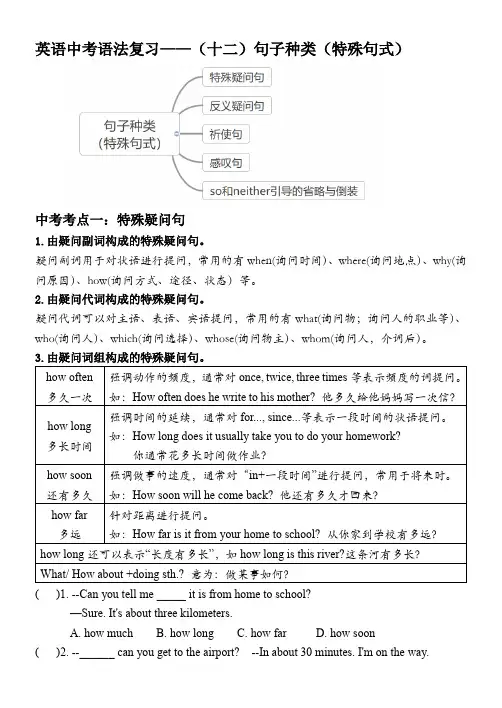
英语中考语法复习——(十二)句子种类(特殊句式)中考考点一:特殊疑问句1.由疑问副词构成的特殊疑问句。
疑问副词用于对状语进行提问,常用的有when(询问时间)、where(询问地点)、why(询问原因)、how(询问方式、途径、状态)等。
2.由疑问代词构成的特殊疑问句。
疑问代词可以对主语、表语、宾语提问,常用的有what(询问物;询问人的职业等)、who(询问人)、which(询问选择)、whose(询问物主)、whom(询问人,介词后)。
how often 多久一次强调动作的频度,通常对once, twice, three times等表示频度的词提问。
如:How often does he write to his mother? 他多久给他妈妈写一次信?how long 多长时间强调时间的延续,通常对for..., since...等表示一段时间的状语提问。
如:How long does it usually take you to do your homework?你通常花多长时间做作业?how soon 还有多久强调做事的速度,通常对“in+一段时间”进行提问,常用于将来时。
如:How soon will he come back? 他还有多久才回来?how far 多远针对距离进行提问。
如:How far is it from your home to school? 从你家到学校有多远?how long还可以表示“长度有多长”,如how long is this river?这条河有多长?What/ How about +doing sth.? 意为:做某事如何?( )1. --Can you tell me _____ it is from home to school?—Sure. It's about three kilometers.A. how muchB. how longC. how farD. how soon( )2. --______ can you get to the airport? --In about 30 minutes. I'm on the way.A. How soonB. How longC. How muchD. How often( )3. --______ have you worked here? —For just one month.A. How oftenB. How longC. How soonD. How much( )4. --We don't have much homework this weekend. Shall we go out together?—OK. What about_______A. to see B seeing C. to see D. sees中考考点二:反义疑问句A. 反义疑问句的标准形式反义疑问句的标准形式是。
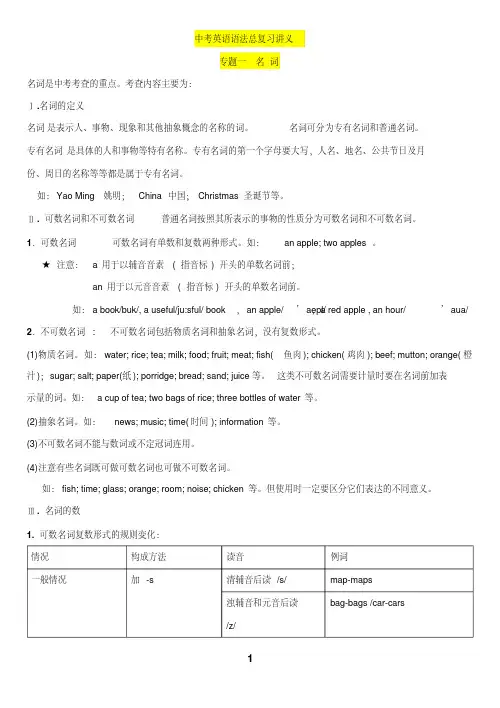
中考英语语法总复习讲义专题一名词名词是中考考查的重点。
考查内容主要为:Ⅰ.名词的定义名词是表示人、事物、现象和其他抽象概念的名称的词。
名词可分为专有名词和普通名词。
专有名词是具体的人和事物等特有名称。
专有名词的第一个字母要大写,人名、地名、公共节日及月份、周日的名称等等都是属于专有名词。
如:Yao Ming 姚明;China 中国;Christmas 圣诞节等。
Ⅱ. 可数名词和不可数名词普通名词按照其所表示的事物的性质分为可数名词和不可数名词。
1.可数名词可数名词有单数和复数两种形式。
如:an apple; two apples 。
★注意: a 用于以辅音音素( 指音标) 开头的单数名词前;an 用于以元音音素( 指音标) 开头的单数名词前。
,a red apple , an hour/’aua/ 如:a book/buk/, a useful/ju:sful/ book ,an apple/’aepl/2.不可数名词: 不可数名词包括物质名词和抽象名词,没有复数形式。
(1)物质名词。
如:water; rice; tea; milk; food; fruit; meat; fish(鱼肉); chicken(鸡肉); beef; mutton; orange(橙汁);sugar; salt; paper(纸); porridge; bread; sand; juice等。
这类不可数名词需要计量时要在名词前加表示量的词。
如: a cup of tea; two bags of rice; three bottles of water等。
(2)抽象名词。
如:news; music; time(时间); information等。
(3)不可数名词不能与数词或不定冠词连用。
(4)注意有些名词既可做可数名词也可做不可数名词。
如:fish; time; glass; orange; room; noise; chicken等。
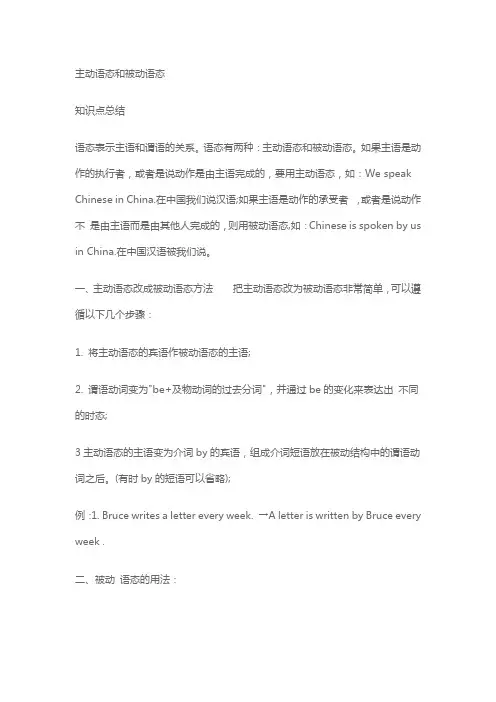
主动语态和被动语态知识点总结语态表示主语和谓语的关系。
语态有两种:主动语态和被动语态。
如果主语是动作的执行者,或者是说动作是由主语完成的,要用主动语态,如:We speak Chinese in China.在中国我们说汉语;如果主语是动作的承受者,或者是说动作不是由主语而是由其他人完成的,则用被动语态,如:Chinese is spoken by us in China.在中国汉语被我们说。
一、主动语态改成被动语态方法把主动语态改为被动语态非常简单,可以遵循以下几个步骤:1. 将主动语态的宾语作被动语态的主语;2. 谓语动词变为"be+及物动词的过去分词",并通过be的变化来表达出不同的时态;3主动语态的主语变为介词by的宾语,组成介词短语放在被动结构中的谓语动词之后。
(有时by的短语可以省略);例:1. Bruce writes a letter every week. →A letter is written by Bruce every week .二、被动语态的用法:1. 一般现在时的被动语态构成:is / am / are + 及物动词的过去分词Our classroom is cleaned everyday.2. 一般过去时的被动语态构成:was / were + 及物动词的过去分词 A new shop was built last year.3. 现在完成时的被动语态构成:has / have + been + 及物动词的过去分词This book has been translated into many languages.4. 一般将来时的被动语态构成:will+ be + 及物动词的过去分词Many more trees will be planted next year.5. 含有情态动词的被动语态构成:情态动词+ be + 及物动词的过去分词Young trees must be watered often.6. 现在进行时的被动语态构成:am / is / are + being + 及物动词的过去分词Uncle Wang is mending my bike now.→My bike is being repaired by Tom now.7. 不定式的被动语态:to + be + 及物动词的过去分词There are tw o books to be read. →There are twenty more trees to be planted.三、使用被动语态应注意的几个问题:1. 不及物动词无被动语态。
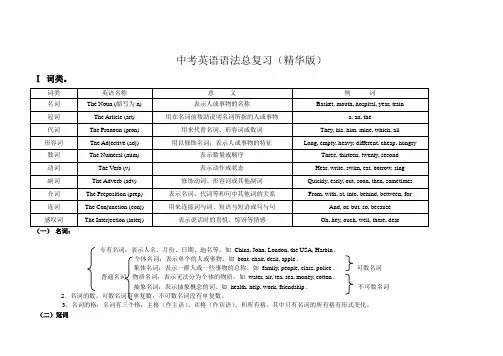
中考英语语法总复习(精华版)Ⅰ词类。
专有名词:表示人名、月份、日期、地名等。
如China, John, London, the USA, Harbin .个体名词:表示单个的人或事物。
如boat, chair, desk, apple .集体名词:表示一群人或一些事物的总称。
如family, people, class, police . 可数名词普通名词物质名词:表示无法分为个体的物质。
如water, air, tea, sea, money, cotton .抽象名词:表示抽象概念的词。
如health, help, work, friendship . 不可数名词 2.名词的数。
可数名词有单复数,不可数名词没有单复数。
3.名词的格:名词有三个格:主格(作主语)、宾格(作宾语)、和所有格。
其中只有名词的所有格有形式变化。
(二)冠词1.定冠词-the .○1特指某(些)人或某(些)事物。
The students are very good.○2说话人与听话人都知道的人或事物。
Where is the toilet ?○3重复提到上文的人或事物。
I have a cat , the cat is white and black .○4表示世界上独一无二的事物。
The moon moves around the earth .○5形容词最高级和序数词前和表示方位的名词前。
I am the oldest . He is the first to school . I live in the south .○6乐器的名称前常用定冠词-the 。
I like playing the piano / violin .○7和某些形容词连用,使形容词名词化,代表某一类人。
We should help the poor .○8放在某些专有名词前。
We will go to visit the Great Wall next week . the people’s Republic of China .○9放在姓氏的复数形式前,表示全家人或夫妇两人。

【中考英语知识点总结,中考英语语法复习资料】★清华大学★英语系测试:为中小学生英语量身定做.官方网站:清华大学英语教授研究组提供中考英语知识点总结,中考英语语法复习资料一、冠词:冠词用在名词的前面,有定冠词“the”与不定冠词“a;an”之分。
定冠词表示“确指”,译作“这(那)个”;不定冠词表示“泛指”,译作“一个”。
例题解析:( ) _____ lady over there is _____ university teacher.A) A, the B) The, an C) The, a D) The, the“over there”意为“那边的”,是后置定语,它表示前面名词“lady”(女士)是“确指”的说法,因此要加上定冠词“the”。
后半句意为“一位大学教师”,是泛指的说法,因此要加上不定冠词“a”或“an”。
由于“university”的读音起始于辅音“j”,因此要加定冠词“a”。
所以本题答案应该选“C”。
( ) He prefers playing _____ piano to playing _____ hockey.A) the, the B) the, / C) / , / D) / , the“piano”意为“钢琴”,属于乐器,要求前面加定冠词“the”。
后半句中“hockey”意为“曲棍球”,属于球类活动,要求不加任何冠词。
所以本题答案应该选“B”。
( ) Mr. Black was made _____ manager of our company.A) / B) a C) an D) the“manager”表示被选的职位,前面不应加任何冠词。
所以本题答案应该选“A”。
此外,冠词还有许多特殊的用法:1. 由普通名词组成的专有名词前,要加定冠词,如:the Great Wall (长城)2. 在拼音名词前,一般不加任何冠词,如:Thomas Green;Changfeng Park3. 在江、河、湖、海前,即使是拼音名词,也要加定冠词“the”,如:the Dongting Lake4. 一般用“单数名词加‘a’;复数名词不加‘the’”来表示“泛指”的意思。
![最新初中中考英语总复习语法大全[可打印]](https://uimg.taocdn.com/7799717f43323968011c92bb.webp)
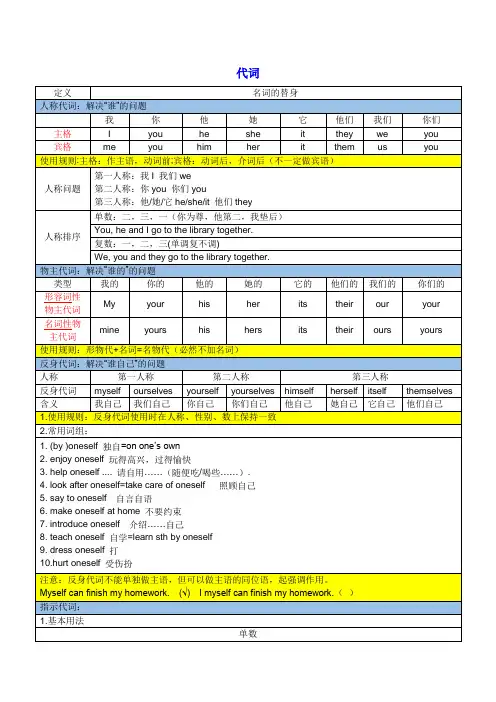
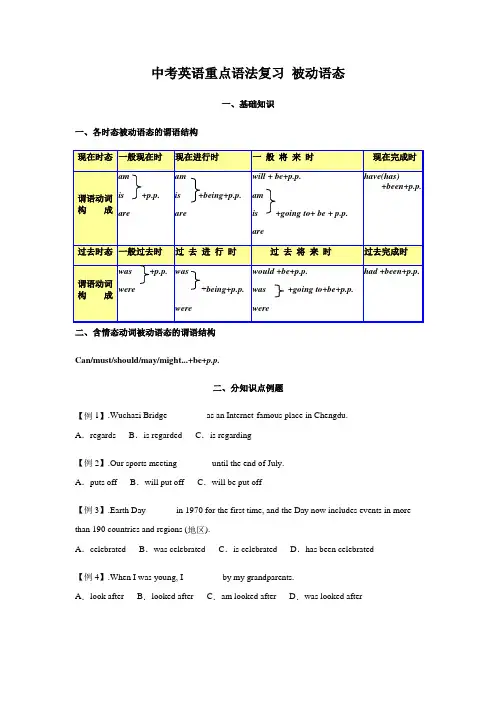
中考英语重点语法复习被动语态一、基础知识一、各时态被动语态的谓语结构二、含情态动词被动语态的谓语结构Can/must/should/may/might...+be+p.p.二、分知识点例题【例1】.Wuchazi Bridge ________ as an Internet-famous place in Chengdu.A.regards B.is regarded C.is regarding【例2】.Our sports meeting _______ until the end of July.A.puts off B.will put off C.will be put off【例3】.Earth Day ______ in 1970 for the first time, and the Day now includes events in more than 190 countries and regions (地区).A.celebrated B.was celebrated C.is celebrated D.has been celebrated【例4】.When I was young, I ________ by my grandparents.A.look after B.looked after C.am looked after D.was looked after【例5】.A number of volunteers will ________ for the 2022 Beijing Winter Olympic Games. A.be needed B.are needed C.are needing D.be needing【例6】.—Tom is always careless with his schoolwork.Could you help him?—No problem!I think he _______ to think twice before starting.A.should be told B.shouldn't be told C.should tell三、巩固训练1.As soon as books ________, the volunteers posted them to the students in Hope Primary School. A.are raised B.were raised C.raised D.have raised2.—Did you notice the students ________ a few why questions in Mr. Zhang’s class?— Yes, I think he wanted to train their abilities of deep thinking.A.are asked B.must be asked C.have been asked D.were asked3.The play Teahouse ________ by the famous Chinese writer Lao She.A.wrote B.was writing C.was written4.Now waste from daily life in the city of Shanghai ________ to be separated into four different groups.A.is requiring B.is required C.was required D.required5.— Why have I never seen this kind of 5G mobile phone?— Because it ___________ by Huawei last week.A.was produced B.would produce C.have produced D.was producing 6.—Sir, I have trouble doing the voluntary work for the 20th Games of Jiangsu Province in Taizhou. —Don’t worry. A lot of support ________ soon.A.is offered B.will be offered C.was offered D.were offered7.The blender________ for making a banana milk shake just now.A.will be used B.was used C.is used8.—How clean your bike is! —Thank you. It ________ very often.A.is washed B.washes C.was washing D.washed9.It is reported that the new robot ________ by a middle school student three years ago. A.invented B.invents C.was invented D.is invented10.—China is getting stronger and stronger. —Yes. So Chinese________ by more and more foreigners.A.learn B.learned C.is learned D.was learned11.Where we should go ________ next Friday.A.is decided B.was decided C.will be decided D.has been decided12.With the development of China, Chinese __________ by more and more people in the world. A.speaks B.is spoken C.speak D.is speaking13.Our school library ________ with plants, lovely desks and chairs, so I feel relaxed while studying or reading there.A.decorates B.decorated C.is decorated D.was decorating14.If the rivers __________, farmers can’t use the water for their crops.A.polluted B.were polluted C.are polluting D.are polluted15.In the year of 2020, each of us ________ by the people like Zhong Nanshan and Li Lanjuan who taught us how to fight against the difficulties in life with a strong will.A.were greatly encouraged B.greatly encouragesC.greatly encouraged D.was greatly encouraged16.China Panda Train from Chengdu to Zunyi _________ to use on March 28, 202l.A.is put B.was put C.will be put D.putsst year Huai'an Flyover(高架) _________. Now it brings much convenience to people. A.finished B.finishes C.is finishing D.was finished18.Many comic books ______ into cartoons in the past 40 years.A.make B.are made C.have make D.have been made19.—I hate sweeping the floor.—Why not buy a sweeping robot? It ________ widely nowadays.A.use B.is used C.was used D.used20.So far this year, many new houses ________ in Wenchuan with the help of the government. A.build B.are built C.will build D.have been built21.These great books ________ by people all over the world today.A.were read B.read C.are read22.How delicious the cake is! It_____________ by my grandmother this morning.A.made B.is made C.was made23.That machine is broken. It ________ tomorrow.A.repaired B.was repaired C.will repair D.will be repaired24.To celebrate the 100th birthday of the Communist Party of China, a speech competition________ in our school last week.A.hold B.held C.is held D.was held25.Fishing _________ in order to protect the ecosystem of Hanjiang River.A.allows B.is allowed C.isn’t allowed D.won’t allow26.A 3-kilometer-long bridge ________ in our hometown three years ago.A.has built B.is built C.was built27.—Can you go out with me tonight?—Sorry, my mother won’t allow me to go out unless my homework __________.A.will be finished B.was finished C.finishes D.is finished28.The Monkey King is a traditional Chinese cartoon hero. Today, he ________ by people of all ages.A.will love B.was loved C.is loved D.will be loved29.In the big earthquake of Gansu, people ______ to the safe places by the army.A.take B.took C.were taken30.In our English class, many chances ________ to students to show themselves.A.offer B.are offered C.offered D.are offering31.Our plan to have a graduation ceremony_____in the next class meeting.A.was discussed B.will discuss C.is discussed D.will be discussed32.As the most exciting and traditional way to shop, street markets __________here and there in China these days.A.find B.found C.are found D.were found33.—Our school sports meeting ___________ next week. Which sport will you take part in? —The long jump and the high jump. I'm good at jumping.A.holds B.held C.was held D.will be held34.—What’s wrong with Dale? — He ___________ with others in his class just now. He’s not happy about that.A.is compared B.was compared C.compares D.compared35.I think e-books will _______more than paper books in the future.A.use B.be used C.used36.— Do we have to read anything next week, Mr Wu?— Sure, You ________ to read Black Beauty from pages 58 to 85.A.were expected B.will expect C.are expecting D.are expected37.— Lily, cars are increasing very fast nowadays.— Actually, lots of convenience (方便) ________ for us.A.provided B.provided C.is provided38.—The last Beidou GEO-3 ______ into space successfully on June 23, 2020.—As Chinese, we feel proud of it.A.sends B.sent C.is sent D.was sent39.—Mr. Wang is very famous in our school.—That's for sure. He ________ by reporters tomorrow.A.interviews B.interviewed C.is interviewed D.will be interviewed40.Our sports meeting _______ until the end of July.A.puts off B.will put off C.will be put off41.Now teenagers ________ to do voluntary work for their local commodities.A.are encouraged B.were encouraged C.have encouraged D.are encouraging 42.—_________ the Communist Party of China (中国共产党) founded in 1921?—Yes, and it’s her 100th birthday this year.A.Is B.Was C.Has D.Have43.—Every year, millions of plastic bottles ________ away, polluting the land and waterways. —That’s terrible. We should protect our environment.A.threw B.are thrown C.have thrown D.were thrown44.Rainbows ________ when sunlight passes through small drops of water in the sky. A.produce B.produced C.are produced D.were produced45.—Will you go to Lisa's housewarming party next Sunday? —Well, if I________, I will go on time.A.invite B.will invite C.am invited D.will be invited46.“I’m still working because I’m still capable and hope to guide more young people,” said Wu Mengchao when he _______.A.is interviewed B.is interviewing C.was interviewed D.was interviewing47.Today, many winter Olympic sports ________ even by children.A.enjoyed B.enjoy C.were enjoyed D.are enjoyed48.—What do you know about the earthquake happened in the morning? —The wounded people ________ to the hospital in time.A.are brought B.were brought C.will be brought49.—Students begin to pay more attention to subjects of art education.—That’s true. They ________ in senior high school entrance examination.A.are tested B.were tested C.will be tested50.Chinese tea is very popular, and it ________ to many different parts of the world.A.is sent B.sends C.has sent51.A lot of teenagers think as they are older and wiser, they ________ to make their own decisions.A.should allow B.shouldn’t allow C.should be allowed D.shouldn’t be allowed 52.No matter how many difficulties we have, I believe all the problems can ________ in the end. A.solve B.be solved C.answer D.be answered53.—What do you think of the games on the internet?— I think they _________ for students during the weekdays.A.should be closed B.are closed C.closed D.were closed54.Some people think trees ________ on Tree Planting Day only.A.should plant B.should be plant C.shouldn’t be planted D.should be planting 55.Some people think trees________on Tree Planting Day only.A.should plant B.should be plant C.should be planted56.—What can we do to protect our environment, Laura?—To make our city more beautiful, rubbish _______ into the river.A.needn’t be thrown B.mustn’t be thrown C.can’t throw D.may not throw 57.The young tree ________ well when it is planted.A.mustn’t watered B.should be watered C.must water D.should water58.We’ll have a birthday party for the child. A pet dog ______ to him as a gift.A.may give B.may be given C.must give D.must be given59.More dinosaur fossils(化石), including footprints, bones or eggs, could ________ in the future. A.discover B.be discovered C.have discovered D.be discovering60.These days, Health Code should ________ before entering public places.A.show B.be shown C.be showing【参考答案】【例1】B 【例2】C 【例3】B 【例4】D 【例5】A 【例6】A巩固练习1.B2.D3.C4.B5.A6.B7.B8.A9.C 10.C11.C 12.B 13.C 14.D 15.D 16.B 17.D 18.D 19.B 20.D21.C 22.C 23.D 24.D 25.C 26.C 27.D 28.C 29.C 30.B31.D 32.C 33.D 34.B 35.B 36.D 37.C 38.D 39.D 40.C41.A 42.B 43.B 44.C 45.C 46.C 47.D 48.B 49.C 50.A51.C 52.B 53.A 54.C 55.C 56.B 57.B 58.B 59.B 60. B。
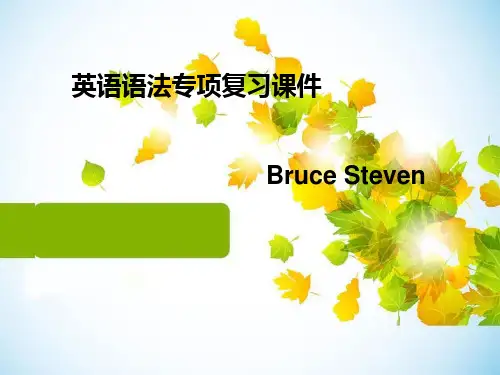
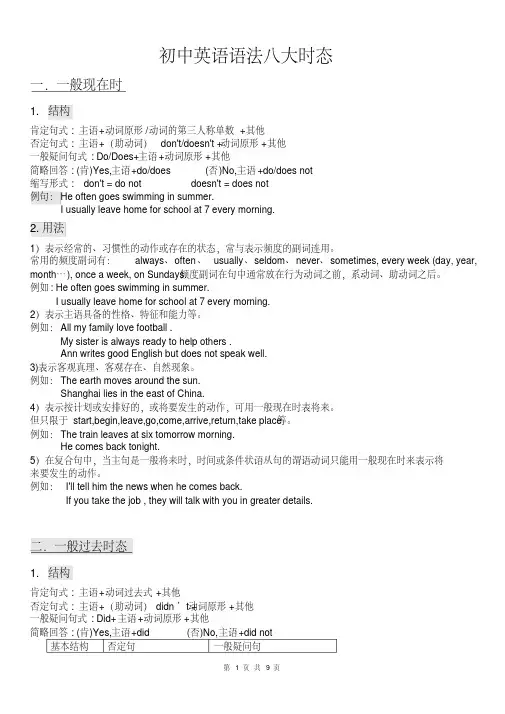
初中英语语法八大时态一.一般现在时1. 结构肯定句式: 主语+动词原形/动词的第三人称单数+其他否定句式: 主语+(助动词)don't/doesn't +动词原形+其他一般疑问句式: Do/Does+主语+动词原形+其他简略回答: (肯)Yes,主语+do/does (否)No,主语+do/does not缩写形式: don't = do not doesn't = does not例句:He often goes swimming in summer.I usually leave home for school at 7 every morning.2.用法1)表示经常的、习惯性的动作或存在的状态,常与表示频度的副词连用。
常用的频度副词有:always、often、usually、seldom、never、sometimes, every week (day, year, month…), once a week, on Sundays.频度副词在句中通常放在行为动词之前,系动词、助动词之后。
例如: He often goes swimming in summer.I usually leave home for school at 7 every morning.2)表示主语具备的性格、特征和能力等。
例如:All my family love football .My sister is always ready to help others .Ann writes good English but does not speak well.3)表示客观真理、客观存在、自然现象。
例如:The earth moves around the sun. Shanghai lies in the east of China.4)表示按计划或安排好的,或将要发生的动作,可用一般现在时表将来。
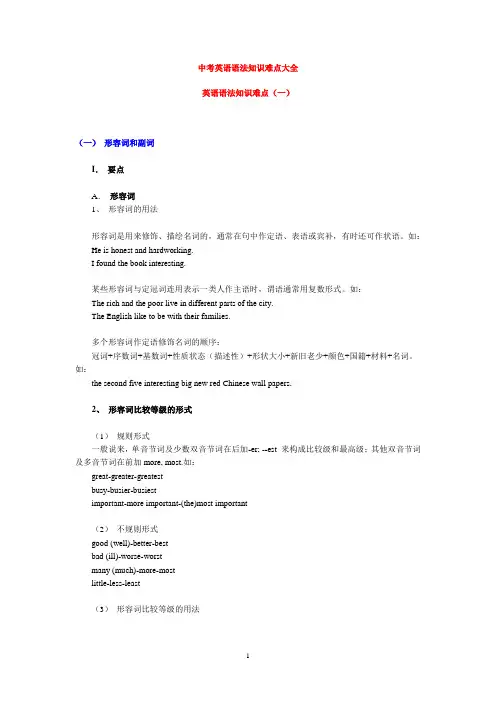
中考英语语法知识难点大全英语语法知识难点(一)(一)形容词和副词I.要点A.形容词1、形容词的用法形容词是用来修饰、描绘名词的,通常在句中作定语、表语或宾补,有时还可作状语。
如:He is honest and hardworking.I found the book interesting.某些形容词与定冠词连用表示一类人作主语时,谓语通常用复数形式。
如:The rich and the poor live in different parts of the city.The English like to be with their families.多个形容词作定语修饰名词的顺序:冠词+序数词+基数词+性质状态(描述性)+形状大小+新旧老少+颜色+国籍+材料+名词。
如:the second five interesting big new red Chinese wall papers.2、形容词比较等级的形式(1)规则形式一般说来,单音节词及少数双音节词在后加-er; --est 来构成比较级和最高级;其他双音节词及多音节词在前加more, most.如:great-greater-greatestbusy-busier-busiestimportant-more important-(the)most important(2)不规则形式good (well)-better-bestbad (ill)-worse-worstmany (much)-more-mostlittle-less-least(3)形容词比较等级的用法①表示两者的比较,用形容词的比较级+than. 如:He is cleverer than the other boys.This one is more beautiful than that one.②表示两者以上的比较,用"the +形容词最高级(+名词)+of(in) …"如:He is the cleverest boy in his class.③表示两者是同等程度,用"as +形容词原级+as". 如:He is as tall as I.I have as many books as you.④越… 越…例如:The more I learn, the happier I am.⑤You can never be too careful. 越小心越好又如:You can never praise the teacher too highly.你怎么赞扬这个老师也不过分。
中考英语语法复习提要一、词类、句子成分和构词法:(1)、词类:英语词类分十种:名词、形容词、代词、数词、冠词、动词、副词、介词、连词、感叹词。
1、名词(n.):表示人、事物、地点或抽象概念的名称。
如:boy, morning, bag,2、代词(pron.):主要用来代替名词。
如:who, she, you, it .3、形容词(adj..):表示人或事物的性质或特征。
如:good, right, white4、数词(num.):表示数目或事物的顺序。
如:one, two, three, first, second,5、动词(v.):表示动作或状态。
如:am, is, are, have, see .6、副词(adv.):修饰动词、形容词或其他副词,说明时间、地点、程度等。
如:7、冠词(art..):用在名词前,帮助说明名词。
如:a, an, the.8、介词(prep.):表示它后面的名词或代词与其他句子成分的关系。
如in, on,9、连词(conj.):用来连接词、短语或句子。
如and, but, before .10、感叹词(interj..)表示喜、怒、哀、乐等感情。
如:oh, well, hi, hello. (2)、句子成分:英语句子成分分为七种:主语、谓语、宾语、定语、状语、表语、宾语补足语。
1、主语是句子所要说的人或事物,回答是―谁‖或者―什么‖。
通常用名词或代词担任。
如:I‘m Miss Green.(我是格林小姐)2、谓语动词说明主语的动作或状态,回答―做(什么)‖。
主要由动词担任。
如:Jack cleans the room every day. (杰克每天打扫房间)3、表语在系动词之后,说明主语的身份或特征,回答是―什么‖或者―怎么样‖。
通常由名词、代词或形容词担任。
如:My name is Ping ping .(我的名字叫萍萍)4、宾语表示及物动词的对象或结果,回答做的是―什么‖。
中考总复习资料之英语语法大串讲一.考点透视【知识与能力要求】1.掌握所学单词的形态变化。
2.掌握简单句的五种基本句型,四笔头练习基本正确。
3.能理解不复杂的、含有状语从句或宾语从句的复合句。
4.掌握动词的五种基本时态(一般现在时、一般过去时、一般将来时、现在进行时、现在完成时)的基本用法。
5.能理解并初步掌握过去进行时、过去完成时和过去将来时的基本用法。
6.掌握一般现在时(包括含有情态动词的一般现在时)、一般过去时的被动语态的基本用法。
7.掌握动词不定式作宾语、宾语补足语和状语的用法(作主语和定语的用法只要求理解)。
【重难点问题归纳】语法知识是在掌握一定量的单词和短语的基础上才能获得的。
因此,单词的形态变化和简单句的五种基本句型是语法学习的基础之基础。
五种基本时态和含有不复杂的状语从句及宾语从句的复合句是初中毕业班学生学习的重点也是语法学习的难点。
五种基本时态中的一般过去时和现在完成时的基本用法及其区别是学习的难点。
状语从句中的时态问题,宾语从句中的主语和谓语的语序问题是学生感到头痛的问题。
被动语态是中国学生最不喜欢学习和使用的一种语态。
因此,学生在学习时,时常感觉到很困难。
动词不定式是初中英语语法中的一个重点。
不定式在句中作宾语、宾语补足语和状语等用法均要求掌握,特别是一些动词,有些后面要求跟不定式作宾语,有些则要求跟动词一ing形式作宾语。
总之,语法部分是英语学习的重点和难点。
语法知识掌握得好,将大大加快英语学习的进程。
【中考热点分析预测】语法部分历年来是中考的必考内容。
考试的范围广,涉及单词词形变化、基本句子结构、五种基本时态搬动语态、不定式用法以及状语从句、宾语从句,等等。
近年来,在教学改革方面加大了对听说教学的力度,初中段以培养学生的交际能力为主,为高中段的英语学习打好基础,对语法知识的要求作了调整,降低了难度,但考查的范围并没有减小。
单纯考语法知识的题比以前明显减少。
试题往往设置一个情景,在对话中考查时态及基本句型。
中考英语语法复习——八大时态初中英语八大时态(讲与练)(一)谓语动词的形式:英语的时态是通过谓语动词的变化来体现的。
因此,了解谓语动词的形式及其变化规律非常重要。
英语的实义动词有以下五种形式:(1) 动词原形:动词原形在句子中形式不变。
主要用于主语为第一、二人称的一般现在时,情态动词之后,或根据语法规定必须用动词原形的其他情况。
(2) 一般现在时第三人称单数形式(简称现单三):主要用于主语为第三人称单数的一般现在时。
(3) 过去式:主要用于一般过去时。
(4) 现在分词:主要用于进行时态。
(5) 过去分词:主要用于完成时态,或被动语态。
谓语动词一般现在时第三人称单数(现单三)的构成,见下表:写和读音规则如下表:的不规则动词表。
谓语动词现在分词一律由动词原形加-ing构成,规则如下表:“时态”就是通过谓语动词的形态变化,来表达动作发生的时间(现在、过去、将来、过去将来)及所处的状态(一般、进行、完成、完成进行)。
1、一般现在时(1)构成:通常以动词原形表示。
主语为第三人称单数时,用单三形式。
(2)用法:1)表示现状、性质、状态和经常的或习惯性的动作。
He has an uncle.他有个叔叔。
Autumn follows summer.夏天之后是秋天。
这些动词可与often, usually, always, sometimes, every day, once a week, on Sundays, never 等表示经常性或习惯性的时间状语连用。
例如:Do you often go to the cinema? 你经常去看电影吗?Tom does not study as hard as Jane. 汤姆在学习方面不如简努力。
My father never takes a bus; he walks to his office.我父亲从来不坐公共汽车,他走着去上班。
2)表示客观现实或普遍真理。
The sun rises in the east. 太阳从东方升起。
中考英语语法知识讲解一、词性【实词】名词、代词、动词、形容词、副词、数词实词是指实在意义,能独立承担句子成分的词,实词有词形的变化。
【虚词】冠词、介词、连词、感叹词与实词相对,虚词没有实在意义,不能独立承担句子成分,虚词没有词形的变化。
1、名词(n.)表示人、事物、地点或抽象概念的名称。
[例]boy, morning, orange, clock, etc.2、代词(pron.)主要用来代替名词。
[例]who, she, you, it, etc.3、形容词(adj.)表示人或事物的性质或特征。
[例]good, white, orange, ugly, etc.4、数词(num.)表示数量或事物的顺序。
[例]one, two, three, hundred, etc.5、动词(v.)表示动作或状态。
[例]am, is, think, does, may, etc.6、副词(adv.)修饰动词、形容词、副词,说明时间、地点、程度等。
[例]now, often, slowly, home, hard, very, really, etc.7、冠词(art.)用在名词前,帮助说明名词。
[例]a, an, the.8、介词(prep.)表示它后面的名词或代词与其他句子成分的关系。
[例]in, on, at, from, above, under, behind, with, without, to, etc.9、连词(conj.)用来连接词、短语或句子。
[例]and, or, before, when, while, after, as soon as, if, unless, until, because, so, though, but, even if, even though, as if, etc.10、感叹词(interj.)表喜、怒、哀、乐等感情。
[例]oh, well, hi, hello, etc.二、句子成分1、主语句子所要说的人或事物,回答是“谁”或者“什么”。
初中英语语法复习归纳一、名词(重点)1、名词的分类(1)专有名词表示人名、地名、星期、月份、日期、山河湖泊、公共建筑等eg: Einstein The United States the Great Wall the Yellow River (2)普通名词:指人或物所共有的名称。
①可数名词个体名词:表示某类人或事物中的个体。
eg: teacher boy book apple 集体名词:一群人或一类物的总称。
eg: police,class,people②不可数名词物质名词:指无法划分个体的物品的名称,也指一类具有共同特点的物品的总称。
eg: air,water,money,paper抽象名词:表示性质、行为、状态、感情等抽象概念。
eg: respect,knowledge2、名词的数(1)可数名词的规则变化①一般情况下直接在词尾加-s。
eg:book→books bag→bags cup→cups②以s, x, sh, ch结尾的词,在词尾加-es.eg:watch→watches bus→buses box→boxes③以f或fe结尾的词,先将f或fe变成v,再在词尾加-es.eg:knife→knives leaf→leaves thief→thieves wolf→wolves④以“辅音字母+y”结尾的词改y为i,再在词尾加-es.eg:family→families city→cities country→countries⑤以o结尾的单词,无生命的加-s.,有生命的加-es.eg:photo→photos piano→pianos hero→heroes potato→potatoes(2)可数名词常见的不规则变化eg:foot→feet tooth→teeth (wo)man→(wo)men mouth→micechild→children ox→oxen(3)单复数同形eg:fish→fish sheep→sheep deer→deer(4)表示某国人的名词复数中日不变,英法同男女,美德奥加s(5)复合名词复数eg:story-teller→story-tellers grown-up→grown-upswoman teacher→women teachers(6)不可数名词的量的表达eg:a bag of rice一袋米 a drop of rain一滴水 a gust of wind一阵风three bottles of water三杯水two cups of tea两杯茶3、名词的所有格(1)'s所有格(大多表示有生命的)①一般情况下在名词词尾加' s.eg:the student 's book Miss Green ' s coat②以-s或-es结尾的复数名词,直接在其后加'.eg:my parents’hope Teachers' Day③不以-s或-es结尾的复数名词,在词尾加' s.eg:Children ' s Day Women ' s Day④两人或多人共同拥有一样东西时,只需在最后一个名词后加’s; 如果不是共有的,则两个词后都要加’s.eg:This is Susan and my l ittle sister’s room.They are Jim’s and John’s father.⑤表示时间、距离、国家、城市、团体等的名词也可以加’s构成所有格。
中考英语语法复习副词知识点1.时间副词ago, already, before, ever, early, late, just, now, once, soon, still, then等1)表示发生时间的副词:例句:It’s beginning to rain now! 现在开始下雨了!2)表示频繁程度的副词,也称频度副词always, often, usually, sometimes, never, ever, hardly等一般位于系动词、情态动词和助动词之后,实义动词之前。
例句:She often changes her mind. 她常改变主意。
3)还有一些其他表示时间的副词:例句:He has just had an operation. 他刚动过手术。
2.地点、方位副词here, there, out, somewhere, abroad, home等1)有不少表示地点的副词:例句:She is studying abroad. 她在国外留学。
2)还有一些部分与介词同形的副词。
它们与介词同形,后跟宾语的是介词,否则是副词:①用作介词:Stand up!起立!②用作副词:A cat climbed up the tree. 猫爬上了树。
3)以where构成的副词也是地点副词:It’s the same everywhere. 到处都一样3.方式副词well, fast, slowly, carefully, quickly1)英语中有大量方式副词,说明行为方式(回答how的问题):例句:How beautifully your wife dances. 你夫人舞跳得真美。
2)还有相当多的副词,表示某些情绪:例句:She smiled gratefully. 她感激的笑了笑。
3)还有一些以-ly结尾的副词,表示动作发生的状况:例句:He left the town secretly. 他悄然离开了这座城市。
第一部分:词法中考考点一、名词一、名词的复数:1.名词变复数的规则形式1).一般情况下直接加s book------books cup-----cups2).以辅音字母+y结尾的,先变y为i再加es .city-------cities family-----families3).以s、x、sh、ch结尾的加es .bus-----buses wish------wishes watch------wathes4).以o结尾的多数加S 初中阶段只有三个单词加es .tomato-----tomatoes potato------potatoes hero-----heroes5).以f、fe 结尾的,先把f、fe变v 再加es .leaf----leaves self---selves shelf----shelves life----lives thief---thieves2.少数名词的复数形式是不规则的。
man----men woman---women child----children foot-----feet tooth----teeth mouse---mice 3.单数和复数形式相同。
deer---deer fish----fish sheep----sheep Chinese ----Chinese Japanese---Japanese4.某国人的复数。
1). 中、日不变。
Chinese----Chinese Japanese---Japanese2). 英、法变。
Englishman----Englishmen Frenchman----Frenchmen3). 其余s加后面。
American -----Americans German----Germans Australian---Australians二、不可数名词:1.不可数名词:1).不能直接用数字表数量 2).不能直接加a或an 3).没有复数形式4).可用some、any 、lots of、plenty of 、much 修饰 5).可用“量词短语”表示2.不可数名词的数量的表示方法: a / 数字+ 量词 + of + 不可数名词a piece of paper a cup of tea a glass of milk三、名词的所有格:1. ’s 所有格。
1).用and连接两个并列的单数名词表示共有关系时,这时只在最后一个名词后加“’s.”This is ____________________(Mary and Lily) bedroom .2). 1).用and连接两个并列的单数名词表示各有关系时,这时分别在每个名词后加“’s.”These are ________________(Tom and Jack ) school bags .3).以s结尾的名词,变所有格时在s后加“’”,不以s 结尾的复数名词,仍加“’s”Teachers’ Day Children’s Day4).表示店铺、医院、诊所、住宅等名称时,常在名词后加’s 代表全称。
at the doctor’s at the Bob’s5).由some、any、no、every与one、body 结合的复合不定代词something 、anything 等和else 连用时,所有格应加在else的后面。
This is _________________(somebody else ) pencil .6).表示时间、距离、国家、城市等无生命的名词,也可在词尾加’s 来构成所有格。
an hour’s ride two weeks’ time China’s capital2.of 所有格:1).of 用来表示无生命的名词所有格。
the map of China the door of the room2).双重所有格:of + 名词所有格 of + 名词性的物住代词He is a friend of my _________(brother ) .Is she a daughter of __________(you)?四、名词作句子成分:1.名词作主语1).表示时间、金钱、距离作主语时,谓语动词用单数。
Two hours ________(be) enough for us to get there .2).量词短语“数字+量词+ of +…”作主语时,谓语动词应与量词保持一致。
A pair of shoes _______(be) under the bed .Two pieces of paper _______(be) on the desk .3).名词+介词(with、except 、along with …….)+名词作主语时,谓语动词应与前面的名词保持一致。
The teacher with the students _________(be) planting trees on the hill .4).短语“neither…nor…、either…or…、not only…but also …”连接主语时,谓语动词实行就近原则。
Neither he nor I ______ (be) a Frenchman .2.名词作定语:1).名词作定语时,一般用单数形式。
There is a shoe factory near the school .2).名词作定语时,个别情况用复数形式。
(sport )The sports meeting will be held next week .3).man、woman 作定语表示性别时,man、woman随后面的名词单复数而变。
one man teacher two women teachers中考考点二:冠词的用法考查重点冠词的考查重点包括不定冠词a和an的用法,定冠词the的用法和零冠词的用法等。
一.a和an的区别不定冠词有a和an两种形式,a用于辅音(不是辅音字母)开头的词前,an用于元音(不是元音字母)开头的词前。
例如:a boy, a university, a European country; an hour, an honor, an island, an elephant, an umbrella, an honest man ,a useful book不看字母看读音,不见原因(元音)别施恩(n)二.不定冠词的用法1.泛指某一类人、事或物;相当于any,这是不定冠词a/an的基本用法。
A horst is an animal2.泛指某人或某物,但不具体说明何人或何物。
A girl is waiting for you.3.表示数量,有“一”的意思,但数的概念没有one强烈。
I have a computer.4.表示“每一”,相当于every.I go to school five days a week.我一周上五天课。
5.用在序数词前,表示“又一”,“再一”。
I have three books. I want to buy a fourth one.6.用在某些固定词组中:a lot(of), after a while ,a few ,a little ,at a time ,have a swim ,have a cold ,in a hurry ,for a long time,have a good time ,have a look三.定冠词的用法1.特指某(些)人或某(些)物,这是定冠词的基本用法。
The book on the desk is mine2.指谈话双方都知道的人或事物。
Open the window, please.3.指上文已经提到的人或事物。
I have a car. The car is red.4.指世界上独一无二的事物。
Which is bigger, the sun or the earth?5.用在序数词,形容词最高级前。
The first lesson is the easiest one in this book.6.用在由普通名词构成的专有名词前。
the Great Wall 长城,the United States 美国7.用在某些形容词前,表示某一类人。
the poor穷人, the blind盲人8用在姓氏复数形式前,表示“全家人”或“夫妻俩”。
the Greens 格林一家或格林夫妻俩9.用在方位词前。
on the left在左边,in the middle of在中间10.用在乐器名称前。
She plays the piano every day.11.用在表示海洋,河流,山脉,群岛及国家和党派等名词前。
the Black Sea黑海,the Yangzi River长江12.用在某些固定词组中:all the same仍然;all the time一直;at the moment此刻;at the same time同时;by the way顺便说;do the shopping/washing买东西/洗衣服;in the morning/afternoon/evening 在上午/下午/晚上;in the open air 在户外,在野外四.零冠词的用法1.棋类,球类,一日三餐名词前不用任何冠词Play chess play football have supper特例:当football,basketball指具体的某个球时,其前可以用冠词:I can see a football.我可以看到一只足球。
Where’s the football?那只足球在哪儿?(指足球,并非“球类运动”)2.季节,月份,星期,节假日名词前不用任何冠词.In July in summer on Monday on Teachers’ Day3.人名,地名,国家名前不加冠词Beijing is the capital of China4.学科,语言,称呼,语职务名词前不用冠词Math is hard to learn5.复数名词表示类别时不加冠词They are workers I like eating apples6.名词前已有物主代词(my,your,his,her等)、指示代词(this/these,that/those)、不定代词(some,any等)及所有格限制时,不用冠词my book(正);my the book(误)7.在表特定的公园,街道,车站,桥,学校等之前。
No.25 Middle School五.用与不用冠词的差异in hospital住院 /in the hospital在医院里in front of在…(外部的)前面 /in the front of在…(内部的)前面at table进餐 /at the table在桌子旁by sea乘船 /by the sea在海边go to school(church…)上学(做礼拜…) /go to the school(church…)到学校(教堂…)去two of us我们当中的两人/the two of us我们两人(共计两人)next year明年 /the next year 第二年a teacher and writer一位教师兼作家(一个人)/a teacher and a writer一位教师和一位作家(两个人)中考专题三:代词一.人称代词:1.主格作主语,宾格作动词或介词的宾语.He teaches ______(we) Chinese .2.三种人称代词并列时,顺序为:单数:二,三,一(You, she and I )复数:一,二,三 (we , you and they )注:若把责任担,第一人称最当先,(即若做错事时,把第一人称放在最前面.)She and I have been to Beijing .Who broke the window ? I and Mike .注:it 还有一些特别的用法。